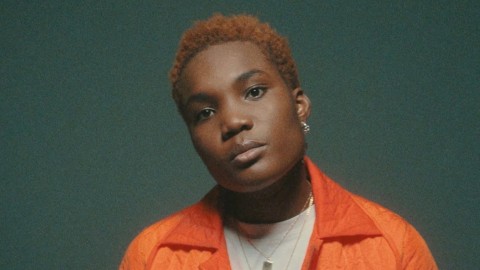
St. Vincent is a master of creating different worlds and reinventing herself with every new musical era. On early records ‘Marry Me’ (2007) and ‘Actor’ (2009), Annie Clark played a fresh-faced “good ol’ Texas gal”, as she once put it, singing, with a demure smirk, of the impending apocalypse.
Three years later, ‘Strange Mercy’ drew out this tension even further, St. Vincent dissecting messy, flawed humanity against uneasy, buzzing orchestration. If smell-o-vision existed for music, that record would be a week-old peach beside an over-chlorinated pool: sickly-sweet, and stickily rotting. For 2014’s self-titled ‘St Vincent’, Clark became a dystopian overlord with fried grey hair; 2017’s ‘MASSEDUCTION’ took the beating heart of glam rock and took it to garish, latex-clad extremes. And here, with ‘Daddy’s Home’, Annie Clark has become a bourbon-swigging rockstar in a power suit and Hunter S. Thompson shades, channelling ‘70s funk and dirty New York grit.
In some ways, this new daddy guise is archetypal St. Vincent: powerful, playful and a bit kinky – all at the same time. In others, ‘Daddy’s Home’ is also a departure from previous form, which saw Clark frequently avoiding filling in autobiographical details in favour of letting her music do the talking.
In 2010, Clark’s father was jailed for his role in a $43m ‘pump-and-dump’ stock manipulation scheme, and was freed two years ago. Though ‘Strange Mercy’ alluded to this period (“Our father in exile – for God only knows how many years,” she sang on the title track). ‘Daddy’s Home’ marks the first time Clark has openly linked her writing to her father’s decade-long imprisonment. In part, she reached this conclusion after the narrative spun out of her control – when Clark was dating model Cara Delevingne in 2016, the tabloids found his court records. She recently told NME: “I wanted to tell my story with a level of humour and compassion.”
This dark humour cuts through the title track, as St. Vincent recounts a final visit to Seagoville’s Federal Correctional Institution, where she signed autographs in the visitation room. It’s also here where Clark lays out her vision for ‘Daddy’s Home’, a record about flawed, trapped people; populated by fallen angels roaming dingy alleyways after flying perilously close to the sun. “We’re all born innocent but some good saints get screwed,” she sings. “Hell, where can you run when the outlaw’s inside you?”
Elsewhere, Clark’s father’s influence is more subtle and sonic. The ‘70s records he played to her growing up permeate through the fabric of ‘Daddy’s Home’, an album heavily influenced by Sly and The Family Stone, Bowie’s ‘Young Americans’ era, Steely Dan and Pink Floyd.
Clark has always written about people who make mistakes and bad choices – growing up in Dallas, Texas against a backdrop of sin, religiosity and rigid tradition, she told NME, has shaped her own forgiving moral worldview. The strutting funk-influenced track ‘Pay Your Way in Pain’ skewers sin as big business especially well. “Pay your way in pain,” she rasps, “you got to pray your way in shame.”
Many different figures are trapped inside ‘Daddy’s Home’ – from the “fallen lamb” she cradles in her arms on ‘Live in the Dream’ to an Icarus-like figure in ‘Somebody Like Me’, who climbs to the top of a skyscraper covered in white paint and wearing clip-on wings. “Does it make you an angel or some kind of freak to believe enough in somebody like me?” Clark asks. “I guess we’ll see”.
Musically, ‘Daddy’s Home’ feels warmer than anything St Vincent has done before, trading in cold precision for looser rock’n’roll sounds that act as a kind of portal into her memories. On various humming interludes, a fuzzy-voiced Clark sings of watching her mother in the kitchen; on the pulsing ‘The Laughing Man’ an emergency call responder buzzes in the background of a slow-burning ballad, seemingly about the aftermath of a death. “Little birds: chirp chirp chirp” Clark sings, “Singing like the day is perfect but to me they sound psychotic.” And the Wurlitzer-laced ‘My Baby Wants A Baby’ weighs up a traditional family life, a dilemma of constraint and comfort. “My baby wants a baby – how can it be wrong? / But I wanna play guitar all day, make all my meals in microwaves.”
In its closing moments, ‘Daddy’s Home’ ends on a slightly puzzling note. The choice to evoke Candy Darling on the closing track – named after the American actor and trans woman who later became a muse for The Velvet Underground, Lou Reed and Andy Warhol – feels incongruous. If Clark is attempting to skew rock’n’roll tradition and represent a fuller, less romanticised picture of Darling – who died of lymphoma aged 29 – she doesn’t quite succeed with lyrics that indulge in the supposed poetry of her tragic death.
It’s the only jarring moment, though. Otherwise, ‘Daddy’s Home’ is Clark’s most welcoming record yet, defined by an arch humour which also brings its listeners closer than ever, and filled with compassion for the characters who dwell within it.

Release date:May 14
Release label: Loma Vista Recordings.
The post St. Vincent – ‘Daddy’s Home’ review: this ’70s funk pastiche is her warmest album yet appeared first on NME.





